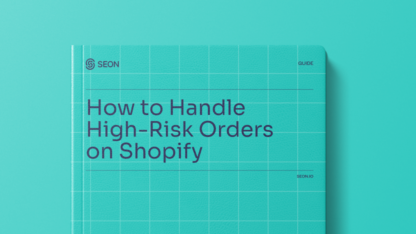Fraud can hit eCommerce merchants hard in today’s digital-first economy, yielding operational challenges that can impact trust, efficiencies and compliance. This week, the Merchant Risk Council (MRC), a vital forum for merchant collaboration with fraud prevention and payment professionals, hosted a webinar led by SEON. Featuring insights from Michael Draper, Vice President of Engineering and Core Systems at Tecovas; John Troutman, Senior Engineer of Digital Fraud at Chipotle; and Miklos Kiss, VP of Product, Fraud Solutions at SEON, the session was expertly moderated by Claire Mauer, Senior Product Marketing Manager at SEON. This 45-minute panel discussion provided an in-depth exploration of the “triple threat” of friendly fraud, return fraud and chargeback fraud that plagues eCommerce businesses.
The webinar recording – available to watch here for MRC members – delves into the participants’ firsthand experiences and strategic approaches for combating prevalent forms of eCommerce fraud. The discussion emphasized the necessity for a nuanced understanding of each fraud type to develop effective defenses, highlighting the importance of tailoring fraud prevention strategies to address the unique challenges posed by each form of fraud – a critical first step toward establishing robust and effective defense mechanisms.
Expert Strategies From the Front Lines
Key insights to help eCommerce businesses effectively manage ubiquitous fraud issues include:
1. Strategic Chargeback Mitigation
Chargebacks not only inflict financial damage but also hinder operational efficiencies. Throughout the conversation, Draper from Tecovas emphasized the necessity of having a dual strategy that combines proactive measures with robust management processes to effectively mitigate chargebacks. He discussed the importance of understanding the triggers and effectively managing disputes to maintain scalability and minimize financial impacts. This strategic integration of prevention and facilitation affords a comprehensive approach to managing chargebacks, essential for sustaining business growth in the face of increasingly sophisticated fraudulent activities.
“Chargeback fraud has a material impact in multiple ways, so making sure you have preventative measures in place, as well as, a chargeback facilitation plan appears to be a key component to operational scale.”
Michael Draper, Tecovas
2. Leveraging AI-Powered Fraud Management
Incorporating AI-powered tools into fraud management systems offers a transformative approach to detecting and preventing fraudulent activity. Throughout the discussion, it was highlighted that utilizing machine learning (ML) and AI algorithms can significantly enhance the precision of fraud detection by analyzing patterns and anomalies in real-time transaction data. This shift from manual reviews to automated intelligence not only boosts the efficiency of processes but also helps in swiftly identifying and managing chargebacks, ultimately reducing operational costs and enhancing the speed of response to fraud threats. The strategic use of AI enables businesses to stay ahead of sophisticated fraud tactics through proactive detection and streamlined management.
“Intelligent automation in fraud management isn’t just about efficiency; it’s about advancing our capabilities to detect and react to fraud more swiftly and accurately than ever before.”
Miklos Kiss, SEON
3. Connecting Data Across Customer Touchpoints
Integrating data from various customer touchpoints – including payment systems, customer service interactions and marketing analytics – creates a cohesive framework for fraud detection. Troutman from Chipotle emphasized how this holistic approach allows businesses to leverage comprehensive customer insights, enhancing their ability to identify and predict potential fraud across different stages of the customer journey. By synthesizing information from these diverse sources, companies can develop a more robust and proactive fraud defense strategy. Such connectivity not only improves the accuracy of fraud detection but also fosters a deeper understanding of customer behaviors, enabling more targeted and effective fraud prevention measures.
“By linking data from all customer touchpoints, we gain a 360-degree view of the customer journey, which is crucial for preempting fraud and tailoring our prevention strategies effectively.”
John Troutman, Chipotle
Adapting and Tailoring Fraud Prevention for Future Challenges
As eCommerce continues to evolve, so must the strategies employed to combat fraud within the sector. Adapting flexible fraud detection parameters is crucial for keeping pace with new trends and changing consumer behaviors. Regular updates and refinements to fraud detection strategies ensure that anti-fraud measures remain effective, not just today but into the future.For those interested in further details or who missed the live webinar, please reach out to our team to connect with a fraud expert. We’d love a chance to connect to explore how we can help your business combat eCommerce fraud more effectively.








